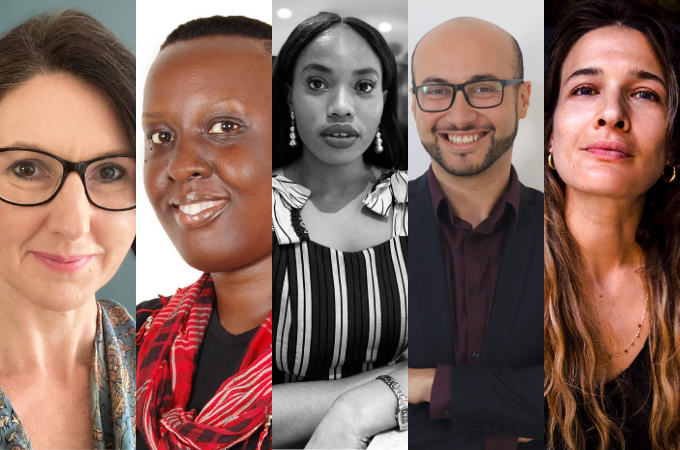
The Island Prize for Debut African Fiction has announced the winners of its inaugural edition, and, in an unprecedented twist of event, everyone on the shortlist is a winner.
In first place is the South African author Sarah Issacs for her manuscript “Glass Tower” described by the judges as “compelling, sensitive prose.” The Ugandan author Doreen Anyango places second with “A Darkness With Her Name on It, which the judges call “an ambitious novel.” The third place is shared among the three other finalists: South Africa’s Marina Auer for “Single Minded,” Algeria’s Hamza Koudri for “Sand Roses” and Nigeria’s Joyce Nwankwo for “Delightful Cage.” [See below for detailed descriptions of the manuscripts.]
The Island Prize for Fiction, set up in 2022, seeks to recognize new literary talents from Africa and provide visibility for their debut projects. It is a manuscript prize for writers seeking to publish their first novel. Named after, and in honor of, South African author Karen Jennings’ Booker-longlisted novel of the same name, the prize is administered by Jennings and her publishers Holland House in the UK and Karavan Press in South Africa.
The judging panel made up of Karen Jennings (South Africa), Hilda Twongyeirwe (Uganda) and Obinna Udenwe (Nigeria) extolled the quality of the winning stories and the diverse themes and styles they span. Read the Judges’ full statement for what it says about how the prize seeks to reshape African literary culture:
“Submissions for the inaugural The Island Prize opened in September of 2021. By the time the submission window ended in mid-December, we had received more than 120 entries from all over Africa. There is a myth that there is only one type of storytelling in Africa. We can say with confidence that this is not the case. The submissions we saw were not only written in a variety of styles, but also included different genres and subjects, depicting people and experiences from all walks of life. You need only look at the shortlist to see a sample of these! However, before we get to the shortlist, we must thank our volunteer readers who spent many hours going through submissions and who helped to whittle them down to a longlist of ten. At this point the judges – Karen Jennings, Obinna Udenwe and Hilda Twongyeirwe – began reading the manuscripts and were pleased to note that the ten longlisted authors came from all over the continent, with the following countries represented: Zambia, Zimbabwe, Nigeria, Kenya, Uganda, South Africa and Algeria. After careful reading, the judges were able to agree unanimously on the five manuscripts selected for the shortlist. Recently they met to decide on the winners.
We would like to make it clear that Holland House Books and Karen Jennings are committed to working with all five shortlisted authors on finetuning their manuscripts, approaching agents, and hopefully getting published. That is the real prize in our eyes. While publishing is the end-goal for any author, the fact is that just getting a foot in the door can seem impossible. The industry is not a kind nor an easy one to navigate. We hope to assist the authors in understanding the processes more and giving them tools to use now and in the future.”
The winning authors will receive a cash award of £500, £300, and £200 for first, second and third place respectively. Consequently, with everyone on the shortlist emerging winners, all the authors are entitled to respective monetary awards in addition to having their manuscripts considered for publication and being introduced to an agent.
Congrats to all the winning authors. Kudos to the prize organizers for bringing the first ever edition of The Island Prize to a successful close.
Read descriptions of the winning stories from the judges below. Note: Submissions for the 2022-23 edition will be open soon. For details on this, please write to Holland House Books at [email protected]. Again congrats to all the winners!
First Place “Glass Towers” by Sarah Isaacs

“A beautiful and carefully constructed narrative about sexual abuse, family relationships and lingering racism at the dawn of the New South Africa. Complex issues are dealt with thoughtfully in simple and sensitive prose to create a moving experience.”
Second Place “A Darkness with Her Name on It” by Doreen Anyango

“An ambitious novel that is concerned with finding identity in a changing, increasingly urban Uganda, while remaining aware of the importance of family ties – both to ancestors and to simple beginnings. The confusing and isolating experiences of dealing with grief and betrayal are brought to the fore.”
Third Place “Single Minded” by Marina Auer

“Set in a public hospital in South Africa during the AIDS pandemic. This fast-paced narrative was informed by the author’s personal experience as a doctor which has enabled her to create a well-crafted mystery centering on the unexpected and inexplicable deaths of seemingly healthy patients. In this compelling story, Auer explores the universal problems of working with seriously limited resources in the face of desperate need.”
Third Place “Sand Roses” by Hamza Koudri

“An extraordinarily immersive narrative, thrusting its reader into the Algerian city of Bousaada during the 1930s and relating a well-researched and fascinating account of the little-known Ouled Nail dancers. Two sisters struggle to earn a living in this traditional way under the cruel restrictions placed on not only the dancers but entire communities by the French colonial administration and their army.”
Third Place “Delightful Cage” by Joyce Nwankwo

“A wonderfully modern narrative set in Lagos, Nigeria. Centered around a strong female protagonist, the novel considers problems we all have – love, work, family, money, friendship – and deals with each of them skillfully, allowing the characters to learn about their own flaws and to forgive the flaws of those around them.”









COMMENTS -
Reader Interactions